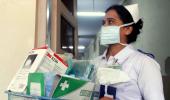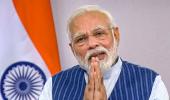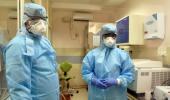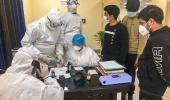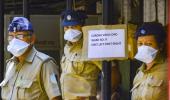AMRI and Fortis are among the tertiary care private hospitals that are COVID-19 ready with isolation wards and dedicated staff to deal with both suspected and confirmed cases, report Jyoti Mukul and Ishita Ayan Dutt.
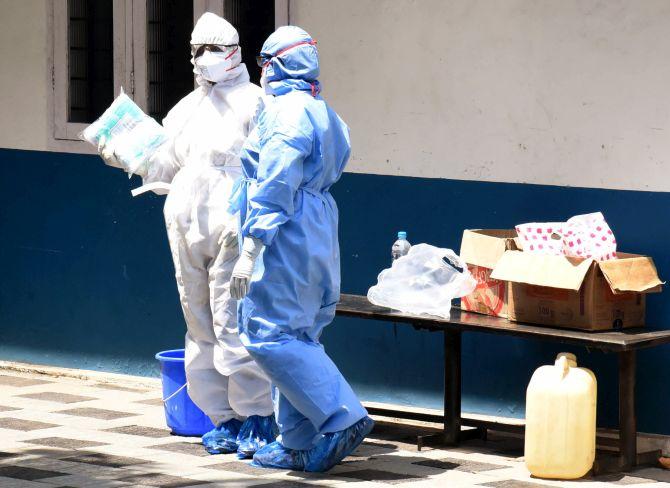
In the heart of Gurugram, next to the HUDA City Centre metro station, currently not in operation because of the 21-day national lockdown, a couple of policemen walk up to Fortis Hospital because one of them has a fever.
They are guided to the flu clinic on the ground floor through a separate passage marked with cones for suspected patients, who have to wear an orange wristband.
Every person who enters the hospital undergoes a check for fever and is required to declare travel history.
Those who are cleared are given a green band and those with fever, cough and cold wear the orange one.
Even employees have to go through this first line of defence against the highly contagious coronavirus disease (COVID-19).
A similar protocol is being followed at AMRI Dhakuria in south Kolkata.
Security guards guide patients and relatives to a table where their temperature is recorded.
AMRI and Fortis are among the tertiary care private hospitals that are COVID-19 ready with isolation wards and dedicated staff to deal with both suspected and confirmed cases.
Fortis has set up isolation wards with 262 beds across its 28 hospitals in the country.
A total of 83 suspected COVID-19 patients and 28 patients, who have tested positive, are under treatment at these hospitals.
Fortis and AMRI have one patient each in the 40-50 age group who is on ventilator.
The AMRI patient works for a non-government organisation that distributes food packets in the slums, and had no travel history in the past month.
In Gurugram, Fortis has so far admitted six COVID-19 patients, of whom four are in their 30s and have been discharged.
The hospital has converted its corporate periodic health check-up area, Health4U, into a Flu Clinic where sample collection and basic tests are done.
In the night, these operations move to a Quarantine Room in the basement.
"Anybody suspected to have COVID-19, they are wheeled into the emergency isolation ward," says Dr Ritu Garg, zonal director, Fortis Memorial Research Institute.
For COVID-19 testing, samples were earlier sent to the government city hospital, but they are now sent to SRL Diagnostics, which charges Rs 4,500. If confirmed, a patient is kept in a separate isolation ward.
"We don't like to call them corona wards, so we refer to them as ER Isolation Ward and Isolation Ward," says Dr Manoj Goyal, director and unit head, pulmonary.
Fortis has converted its chemotherapy daycare ward into the main isolation ward that has a separate entry and a small window for food and beverage service.
The isolation ward at the Dhakuria unit has a four-bed ward and a single room for Covid-suspect cases.
There are about three doctors and six nurses in the ward, said Ashok Mishra, head of emergency and nodal officer for AMRI Dhakuria.
Critical or COVID-positive cases are, however, put in the ITU where two beds have been kept for isolation.
The pathway to the COVID-dedicated ITU, again, is different.
AMRI has an extracorporeal membrane oxygenation (ECMO) machine that can serve as life-saving rescue therapy for refractory respiratory failure.
One such machine is located at its Bhubaneswar unit. Just the cost of consumables for use for a first day in an ECMO is Rs 1.5 lakh and over a period of three to five days, it could be Rs 4-5 lakh.
"Right now, cost is not important," said, Rupak Barua, group chief executive officer and director, AMRI Group of Hospitals.
Fortis is in the process of aligning its charges with the Haryana government notified rates, says Dr Garg.
It is the resources that are needed for dealing with such patients that make the treatment costlier.
"The level of criticality is same as in other patients with serious conditions. The only added risk is of healthcare workers and the additional gear that is required to mitigate it. This increases the cost," says Dr Sandeep Dewan, director and head of the department, Critical Care Medicine at Fortis.
Dr Dewan, who sits at the command centre that has a computer with four screens and a two-way speaker, says, "We can look at notes on one screen, vitals on the other, see the patients and hold consultations on the fourth."
Inside the isolation ward, a general duty assistant (GDA) attends to a patient on ventilator.
Besides the GDA, nurses enter the ward to monitor. Between the command centre and bed-side monitoring, there is electronic monitoring done by the critical care management team.
Dr Gupta says COVID-19 attacks the lungs and leads to severe pneumonia.
"We give them supportive treatment because lung function is impaired but if the situation deteriorates, like other organ failure, they are put on ventilator."
There is specific treatment directed at the virus, too, though there isn't any proven medication for it.
The bigger challenge is the supply of personal protective equipment (PPE).
Medical staff have to wear fresh PPE every time they enter the ward.
Dr Gupta says the gear is later incinerated and a fresh one used next time. Remote monitoring reduces the pressure on PPEs.
Hospitals are seeing lower footfalls because patients are avoiding routine visits.
Doctors, too, have started consulting online while elective and planned surgeries have been put on hold.
Focus is to swiftly move to check the spread of pandemic.
"It is important to have experienced people so that they can identify COVID-suspect cases," says Dr Mishra.

